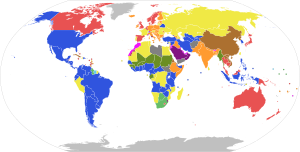 Image via Wikipedia
Image via WikipediaIndia has both president and prime minister. While parliament elects the president, selection of the prime minister who is also the leader of the majority party, is the prerogative of the president. All bills have to be approved by the president before becoming law. The vice president who is ex officio acts in place of the president especially when the president fails to perform his duties. The president is the chief of state while the prime minister is head of government (Bureau of South and Central Asian Affairs, 2011). The Indian legal system is based on the English model; there are separate personal law codes that apply to Muslims, Christians, and Hindus.
Unlike India’s parliamentary system which is at times clangorous, Presidentialism, America’s preferred system of governance is more stable and promising. India and the U.S. are two major democracies known for their pursuance of economic growth and technological advancement. While India is a young democracy that gained independence from England as recent as 1947 after a devastating war that saw the segmentation of the expansive Indian sub-continent, America’s democratic growth has been in the making since 1776 when it also declared independence from England after a brutal war. India’s democracy remains to be a victim of corruption that is having profound impact on the nation’s dwindling economy. To the contrary, there is corruption in the U.S. system but to a lesser degree. According to Maeda and Nishikawa (2006), differences exist between parliamentary and presidential systems of government when it comes to survival duration. According to the authors, while parliamentary governments may collapse within short periods, presidential systems remain to be more established due to fixed terms.
India and the U.S. have well established relationships that include political as well as commercial dealings. Many U.S. corporations have moved their businesses to India to exploit the nation’s abundant cheap labor and untapped advanced education system that is credited with producing a great number of young, educated professionals. On the other hand, India relies on America’s educational institutions to train a great number of Indian doctors, engineers, scientists, and other professionals. By working hand in hand, India and the U.S. have a lot to gain from each other in the foreseeable future.
References
Library of Congress (2004). Country Profile: India. Retrieved from http://lcweb2.loc.gov/frd/cs/profiles/India.pdf
Bureau of South and Central Asian Affairs, U.S. Department of State (2011). Background note: India Retrieved from http://www.state.gov/r/pa/ei/bgn/3454.htm
Maeda, K., & Nishikawa, M. (2006). Duration of party control in parliamentary and presidential governments: A study of 65 democracies, 1950 to 1998. Comparative Political Studies, 39(3), 352–374.


No comments:
Post a Comment